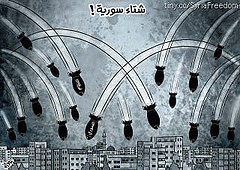Syria's Winter by FreedomHouse
In an exclusive interview with the Associated Press Wednesday, newly elected leader of the Free Syrian Army, Salim Idris, expressed fear Bashar al-Assad's regime was preparing to unleash chemical weapons on Syrian rebel strongholds. Early in December, US intelligence reported increased activity at known Syrian chemical weapons sites; activity that would suggest chemical weapons were being prepared for use. The reports prompted the UN to send chemical-weapons kits to members of its Disengagement Observer Force in the Golan Heights, which is split between Syria and Israel, in preparation for an attack.
Salim Idris revealed during the interview that he had received information from sources within Assad's regime that warned him Assad was training more ready-to-fire missiles to use against rebel forces. In a severe escalation of the conflict in early December, Syrian forces controlled by Assad fired Scud missiles at rebel strongholds in Northern Syria. Syria's decades-long chemical-weapons program has produced an impressive arsenal of chemical weapons, which include chemical warheads for Scud missiles. Depending on the chemical agent contained in the warhead and the type of Scud missile used, the effects of such an attack could include mass casualties; economic and social turmoil are guaranteed.
Syria's aggressive pursuit of a chemical-weapons program began in the 1980s under the direction of President Hafez al-Assad, Bashar al-Assad's father. Chemical weapons first appeared in Syria in 1973 on the eve of the Yom Kippur war; they were provided by Egypt. Syria's repeated military defeat in its wars against Israel combined with the loss of Egypt as a military ally due to the 1979 Egypt-Israel peace agreement was the primary motivation for Syria's domestic chemical-weapons program. By 1986, Syria had brought its chemical-weapons program on-line and was capable of producing nerve agents for use in combat.
The Damascus-based facility Centre D'Etudes et de Recherches Scientifiques (CERS) is the center of Syria's chemical-weapons program. Known chemical agents produced by Syria include Sarin, a lethal nerve gas that could result in permanent neurological damage in even low exposure, mustard gas, and the even more potent and deadly VX. While intelligence reports maintain that Syria is dependent on foreign imports for the precursor chemicals necessary to develop its chemical weapons, by the year 2000 it reportedly already possessed stockpiles of hundreds of tons of nerve agents. CERS and a variety of Syrian petrochemical and pharmaceutical firms have taken the lead in obtaining the dual-use technology needed to support its chemical-weapons program.
As early as March 2012, the U.S. recognized the need to prepare for military intervention in Syria due to the country's arsenal of chemical weapons. The possible scenarios the U.S. acknowledged included Bashar al-Assad using chemical weapons in the civil war and terrorist organizations obtaining chemical weapons in the chaos of regime change. Secretary of Defense Leon Panetta testified to the Senate Armed Services Committee on March 7th that securing Syria's chemical-weapons arsenal would require an estimated 75,000 troops. The Free Syria Army has prepared units to secure Assad's chemical-weapons sites, but even their commander questions their ability to prevent their use in the civil war and secure the largest chemical-weapons arsenal in the Middle East.
Until the outbreak of the civil war, Syria officially denied the existence of a chemical-weapons program, despite refusing to sign the Chemical-Weapons Convention, an arms-control treaty. Public acknowledgement of Syria's chemical-weapons program did not come until the July 2012 statement of Foreign Ministry Spokesman Jihad Makdissi that Syria would not use chemical weapons against Syrians. In the same statement, Makdissi warned that Syria would consider unleashing its chemical weapons if threatened with a foreign intervention.
On Monday, Syrian Ambassador to the UN Bashar Ja'afari circulated letters to the Security Council that expressed concern Syrian rebels had been provided chemical weapons by foreign governments, which they planned to use and then blame on the Assad regime. The Free Syria Army has reported that Assad's regime has moved chemical weapons to airports near its borders in preparation for a foreign invasion. Syria has no confirmed history of using chemical weapons in combat, not even to prevent its military defeat by Israel in the Yom Kippur war. Analysts concluded Syria would only use chemical weapons in the event of the total collapse of the government.
According to recent defector Major General Adnan Sillou, a former top official in Syria's chemical-weapons program, that time is now. If rebel forces take control of Aleppo, Sillou told ABC News, al-Assad's response to the victory would be to unleash Syria's chemical-weapons capabilities.





